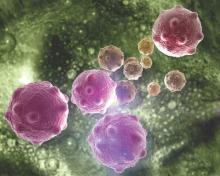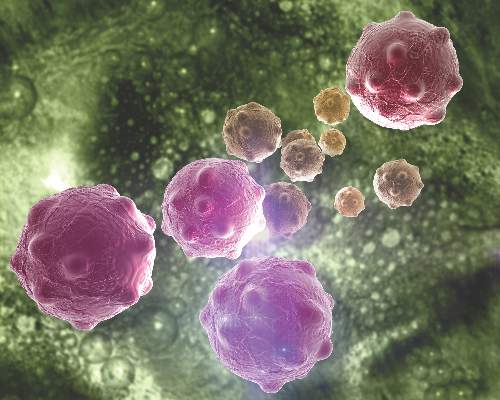User login
Ruxolitinib showed clinical activity in patients with metastatic pancreatic cancer refractory to gemcitabine, particularly in those with elevated C-reactive protein (CRP) levels indicating systemic inflammation, according a study published online in Journal of Clinical Oncology.
Patients randomly assigned to receive ruxolitinib + capecitabine had overall survival similar to that of the placebo + capecitabine group; however, in the subgroup of patients with elevated CRP (greater than the median in the study of 13 mg/L), median overall survival was significantly greater with ruxolitinib: 2.7 vs. 1.8 months (HR, 0.47; 95% CI, 0.26-0.85; P = .011).
Ruxolitinib inhibits Janus kinases (JAK1/JAK2), part of the JAK/STAT pathway that is downstream from multiple receptor tyrosine kinases and involved in inflammatory responses of both tumor and normal tissue. JAK/STAT inhibition represents a novel cancer treatment strategy that may impact both cancer cells and the immune response to malignancy.
“These results additionally support the importance of cytokine signaling and JAK/STAT signaling in pancreatic cancer and highlight the potential role for JAK inhibition as a novel therapeutic strategy for these patients,” wrote Dr. Herbert Hurwitz of Duke University, Durham, N.C., and colleagues (J Clin Oncol. 2015 Sep 7. doi:10.1200/JCO.2015.61.4578).
Patients on ruxolitinib showed benefit in progression-free survival, tumor burden, and clinical benefit response (a composite of pain intensity, analgesic use, performance status, and body weight). Clinical benefit response was 12.5% in the ruxolitinib group compared with 1.5% for placebo (P = .017). These findings suggest ruxolitinib affects the host response to tumor as well as the tumor itself.
The double-blind phase II study comprised 127 patients from 41 U.S. centers; 64 received ruxolitinib + capecitabine and 63 received placebo + capecitabine.
Anemia was the most common hematologic adverse event, with grade 3 anemia occurring in 15.3% and 1.7% of the ruxolitinib and placebo groups, respectively. Nonhematologic grade 3 or greater adverse events that occurred more frequently for ruxolitinib included stomatitis, pneumonia, and pulmonary embolism.
Incyte Corporation funded the study. Dr. Hurwitz reported consulting or advisory roles with Incyte Corporation, Genentech, ImCone Systems, Bristol-Myers Squibb, Sanofi, Eli Lilly, Regeneron Pharmaceuticals, Amgen, Novartis, Bayer AG, TRACON Pharmaceuticals, Acceleron Pharma, and GlaxoSmithKline. All of his coauthors were employed by or received research funding from Incyte Corporation, as well as other industry sources.
Ruxolitinib showed clinical activity in patients with metastatic pancreatic cancer refractory to gemcitabine, particularly in those with elevated C-reactive protein (CRP) levels indicating systemic inflammation, according a study published online in Journal of Clinical Oncology.
Patients randomly assigned to receive ruxolitinib + capecitabine had overall survival similar to that of the placebo + capecitabine group; however, in the subgroup of patients with elevated CRP (greater than the median in the study of 13 mg/L), median overall survival was significantly greater with ruxolitinib: 2.7 vs. 1.8 months (HR, 0.47; 95% CI, 0.26-0.85; P = .011).
Ruxolitinib inhibits Janus kinases (JAK1/JAK2), part of the JAK/STAT pathway that is downstream from multiple receptor tyrosine kinases and involved in inflammatory responses of both tumor and normal tissue. JAK/STAT inhibition represents a novel cancer treatment strategy that may impact both cancer cells and the immune response to malignancy.
“These results additionally support the importance of cytokine signaling and JAK/STAT signaling in pancreatic cancer and highlight the potential role for JAK inhibition as a novel therapeutic strategy for these patients,” wrote Dr. Herbert Hurwitz of Duke University, Durham, N.C., and colleagues (J Clin Oncol. 2015 Sep 7. doi:10.1200/JCO.2015.61.4578).
Patients on ruxolitinib showed benefit in progression-free survival, tumor burden, and clinical benefit response (a composite of pain intensity, analgesic use, performance status, and body weight). Clinical benefit response was 12.5% in the ruxolitinib group compared with 1.5% for placebo (P = .017). These findings suggest ruxolitinib affects the host response to tumor as well as the tumor itself.
The double-blind phase II study comprised 127 patients from 41 U.S. centers; 64 received ruxolitinib + capecitabine and 63 received placebo + capecitabine.
Anemia was the most common hematologic adverse event, with grade 3 anemia occurring in 15.3% and 1.7% of the ruxolitinib and placebo groups, respectively. Nonhematologic grade 3 or greater adverse events that occurred more frequently for ruxolitinib included stomatitis, pneumonia, and pulmonary embolism.
Incyte Corporation funded the study. Dr. Hurwitz reported consulting or advisory roles with Incyte Corporation, Genentech, ImCone Systems, Bristol-Myers Squibb, Sanofi, Eli Lilly, Regeneron Pharmaceuticals, Amgen, Novartis, Bayer AG, TRACON Pharmaceuticals, Acceleron Pharma, and GlaxoSmithKline. All of his coauthors were employed by or received research funding from Incyte Corporation, as well as other industry sources.
Ruxolitinib showed clinical activity in patients with metastatic pancreatic cancer refractory to gemcitabine, particularly in those with elevated C-reactive protein (CRP) levels indicating systemic inflammation, according a study published online in Journal of Clinical Oncology.
Patients randomly assigned to receive ruxolitinib + capecitabine had overall survival similar to that of the placebo + capecitabine group; however, in the subgroup of patients with elevated CRP (greater than the median in the study of 13 mg/L), median overall survival was significantly greater with ruxolitinib: 2.7 vs. 1.8 months (HR, 0.47; 95% CI, 0.26-0.85; P = .011).
Ruxolitinib inhibits Janus kinases (JAK1/JAK2), part of the JAK/STAT pathway that is downstream from multiple receptor tyrosine kinases and involved in inflammatory responses of both tumor and normal tissue. JAK/STAT inhibition represents a novel cancer treatment strategy that may impact both cancer cells and the immune response to malignancy.
“These results additionally support the importance of cytokine signaling and JAK/STAT signaling in pancreatic cancer and highlight the potential role for JAK inhibition as a novel therapeutic strategy for these patients,” wrote Dr. Herbert Hurwitz of Duke University, Durham, N.C., and colleagues (J Clin Oncol. 2015 Sep 7. doi:10.1200/JCO.2015.61.4578).
Patients on ruxolitinib showed benefit in progression-free survival, tumor burden, and clinical benefit response (a composite of pain intensity, analgesic use, performance status, and body weight). Clinical benefit response was 12.5% in the ruxolitinib group compared with 1.5% for placebo (P = .017). These findings suggest ruxolitinib affects the host response to tumor as well as the tumor itself.
The double-blind phase II study comprised 127 patients from 41 U.S. centers; 64 received ruxolitinib + capecitabine and 63 received placebo + capecitabine.
Anemia was the most common hematologic adverse event, with grade 3 anemia occurring in 15.3% and 1.7% of the ruxolitinib and placebo groups, respectively. Nonhematologic grade 3 or greater adverse events that occurred more frequently for ruxolitinib included stomatitis, pneumonia, and pulmonary embolism.
Incyte Corporation funded the study. Dr. Hurwitz reported consulting or advisory roles with Incyte Corporation, Genentech, ImCone Systems, Bristol-Myers Squibb, Sanofi, Eli Lilly, Regeneron Pharmaceuticals, Amgen, Novartis, Bayer AG, TRACON Pharmaceuticals, Acceleron Pharma, and GlaxoSmithKline. All of his coauthors were employed by or received research funding from Incyte Corporation, as well as other industry sources.
FROM JOURNAL OF CLINICAL ONCOLOGY
Key clinical point: Ruxolitinib showed clinical activity in patients with refractory metastatic pancreatic cancer, particularly in those with signs of systemic inflammation.
Major finding: In patients with elevated C-reactive protein who received ruxolitinib vs. placebo, the median overall survival was 2.7 vs. 1.8 months (HR, 0.47; 95% CI, 0.26-0.85; P = .011).
Data source: A double-blind phase II study of 127 patients, 64 who received ruxolitinib + capecitabine and 63 who received placebo + capecitabine.
Disclosures: Incyte Corporation funded the study. Dr. Hurwitz reported consulting or advisory roles with Incyte Corporation, Genentech, ImCone Systems, Bristol-Myers Squibb, Sanofi, Eli Lilly, Regeneron Pharmaceuticals, Amgen, Novartis, Bayer AG, TRACON Pharmaceuticals, Acceleron Pharma, and GlaxoSmithKline. All of his coauthors were employed by or received research funding from Incyte Corporation, as well as other industry sources.

